The Saint of the Day
 |
 |
 |
 |
 |
 |
 |
St. Dominic of Guzman - August 4
Biographical selection:
In this excerpt from the work Dialogue of Divine Providence (1370), God the Father speaks to St. Catherine of Siena, a Third Order Dominican, about her Founder. God said to St. Catherine:
"It was precisely upon the light of science that the father of the Preachers established his principle foundation. And he made of it his aim and his weapon of combat to extirpate the errors that had arisen in his time. He took upon himself the office of the Word my Son, sowing My word, dispelling darkness, enlightening the earth. Mary, by whom I gave him to the world, made him the extirpator of heresies."
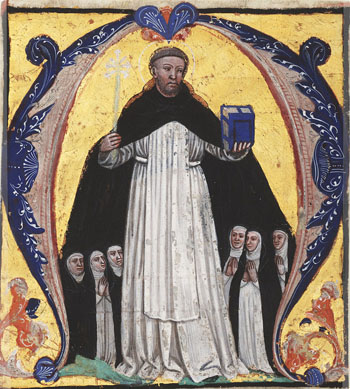 Dom Guéranger comments on this excerpt in The Liturgical Year:
Dom Guéranger comments on this excerpt in The Liturgical Year:
Thus, the Order, called to be the principal support of the Papacy in uprooting pernicious doctrine, ought, if possible, to justify that name [extirpator of heresies] even more than its Patriarch. The first tribunal of the Holy Roman Universal Inquisition, the Holy Office, truly invested with the Office of the Word with its two-edged sword (Apoc 19:11-16) – to convert and to chastise – could find no instrument more faithful or more sure than the Dominican Order.
Little thought the virgin of Sienna, or the illustrious author of the Divine Comedy [Dante], that a time would come when that chief title of the Dominican Family [extirpator of heresies], which earned the recognition and grateful love of the people, would be discussed in a certain [liberal] school of apologetics, and there discarded as insulting, or dissembled as unpleasant.
The present age glories in a Liberalism that has given proofs of its power by multiplying ruins and which rests on no better philosophical basis than a strange confusion between license and liberty.
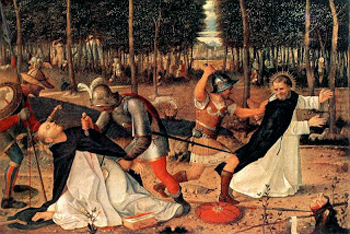 Only such intellectual groveling could have failed to understand that, in a society which has Faith for the basis of its institutions as well as the principle of salvation for mankind, no crime could equal that of shaking the foundation upon which rest both social interest and the most precious possession of individuals. Neither the ideal of justice, nor still less that of liberty, could consist in leaving to the mercy of evil or evil men, the weak who are unable to protect themselves.
Only such intellectual groveling could have failed to understand that, in a society which has Faith for the basis of its institutions as well as the principle of salvation for mankind, no crime could equal that of shaking the foundation upon which rest both social interest and the most precious possession of individuals. Neither the ideal of justice, nor still less that of liberty, could consist in leaving to the mercy of evil or evil men, the weak who are unable to protect themselves.
This truth was the axiom and the glory of chivalry. The brothers of Peter the Martyr (Dominicans) devoted their lives to protect the safety of the children of God against the surprises of "strong armed man"" (Lk 11:21) and the "business that walked about in the dark." (Ps 91:6). It was the honor of the "saintly flock" led by Dominic along a path "where well one fattens if he strayeth not" (Dante, Paradise, X, 94-96).
Comments of Prof. Plinio:
This selection is a good and rare example of what a non-white heresy (1) description should be. To praise the defense of good doctrine is excellent!
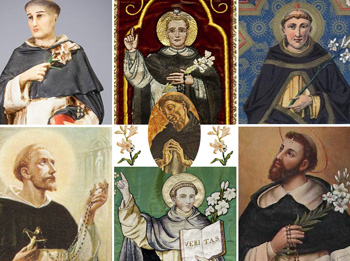 By contrast, you can see how much white heresy has penetrated the presentation of hagiographies. Consider any life of a saint written according to the
white heresy conception: generally speaking there is always this sentiment: "He was so very goooood…, he forgave his enemies, he healed many sick persons, and he pleased the little children…" In other words, sanctity always has to express sweetness in the treatment of others.
By contrast, you can see how much white heresy has penetrated the presentation of hagiographies. Consider any life of a saint written according to the
white heresy conception: generally speaking there is always this sentiment: "He was so very goooood…, he forgave his enemies, he healed many sick persons, and he pleased the little children…" In other words, sanctity always has to express sweetness in the treatment of others.
It is very difficult to see someone praise a Saint in the following way: "He zealously guarded sound orthodoxy of doctrine, he hatred and extirpated heresy." For the white heresy conception, this fight for orthodoxy belongs to the intellectual sphere and should not be seen as a moral virtue. This praise would also appear unseemly because the man who combated heresy made others suffer and, thus, became obnoxious.
In times past, when sanctity was still the norm for the clergy, there was a highly-placed Prelate here in Brazil who gave his secretary this advice:
"Fr. X, you should take as a norm for sanctity to do everything that you deem to be good, but do not do anything that can make someone suffer, because this would not be a good act. The good man never causes a person to suffer."
This advice reflects a strictly white heresy mentality. Neither the need to defend Catholic doctrine nor the need to correct those who err is understood. The adepts of this mentality say: "This is an intellectual concern, a matter for scholars; it is not virtue."
Now then, the contrary is true. The love of God must necessarily express the love for what good doctrine says about God. I know God through good doctrine. I love God according to what the good doctrine taught me. Therefore, it is through good doctrine that I know Our Lord Jesus Christ, the Word Incarnate, and what He taught and did. Orthodoxy is nothing but the love of God. So, it is absurd to pretend to have virtue without orthodoxy; another absurdity is to pretend to be orthodox without hating evil.
Therefore, the first virtue must be maintaining the orthodoxy of doctrine, because it is one of the aspects of the love of God. He who says orthodoxy, necessarily says combativeness. The more a man is combative, the more orthodox he is and the more he loves God.
This is a first set of observations that comes to mind after reading the excerpt of Dom Guéranger praising the great mission of the Dominican Order.

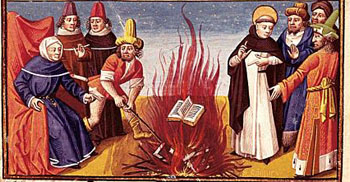 The second observation is that this excerpt is a beautiful defense of the legitimacy of the Inquisition, the Holy Wars, and the polemic, which Pacifism makes a great effort to deny.
The second observation is that this excerpt is a beautiful defense of the legitimacy of the Inquisition, the Holy Wars, and the polemic, which Pacifism makes a great effort to deny.
I would like to stress here that when some State gives error the possibility to spread, then that State is implicitly supporting persecution of the truth; when a State gives liberty to evil or evil ones, it is implicitly supporting the persecution of the good and the good ones. It belongs to the very nature of the error to be contagious; after original sin man has a natural appetite for error. So, when one gives liberty to error, sooner or later the error will be persecuting the truth.
In a magnificent passage, Donoso Cortes (an Spanish Ultramontane thinker of the 19th century) affirmed that the miracle of the existence of the Catholic Church did not consist in her being accepted because she was good and holy, but rather despite her being good and holy. Men have an enormous attraction toward error and evil. If we give evil and error freedom, they overtake men. Therefore, there is no worst tyranny and cruelty than to advocate liberty for the error and evil.
Dom Guéranger sets out well what the ideal of Chivalry was: It was to defend the widow, the orphans and the weak. I ask: Are not today's ignorant souls more forsaken than the widows and orphans in the Middle Ages? Are not the souls with bad tendencies today more exposed to error than the widows and orphans at the time of Chivalry? Yes, they are. And we know that it is more important to defend the soul than the body.
Consequently, the chivalric nobility in our days is concentrated in those who boldly combat error and evil.
There is a melancholic historic observation that I cannot avoid making: If you consider what the Dominican Order was and what it is today in Brazil, you understand the enormous decadence into which it has fallen. You will also understand that the worst evil in our century is not that the communists are what they are. The worst evil is that those who should combat Communism are what they are and have adopted the wrong positions that they have taken up today.
On the feast day of St. Dominic it is most a propos to offer our prayer this evening as a type of reparation made to the Holy Founder of the Dominicans for the offense he is receiving today from the perversion of his admirable Order, and to ask him to defend us from the attacks of his sons who have gone astray.
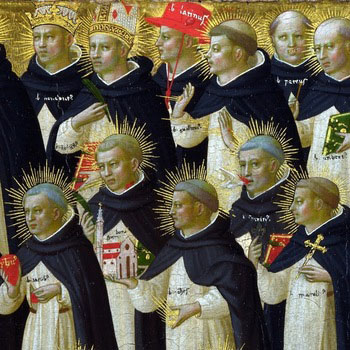


The Saint of the Day features highlights from the lives of saints based on comments made by the late Prof. Plinio Corrêa de Oliveira. Following the example of St. John Bosco who used to make similar talks for the boys of his College, each evening it was Prof. Plinio’s custom to make a short commentary on the lives of the next day’s saint in a meeting for youth in order to encourage them in the practice of virtue and love for the Catholic Church. TIA thought that its readers could profit from these valuable commentaries.
The texts of both the biographical data and the comments come from personal notes taken by Atila S. Guimarães from 1964 to 1995. Given the fact that the source is a personal notebook, it is possible that at times the biographic notes transcribed here will not rigorously follow the original text read by Prof. Plinio. The commentaries have also been adapted and translated for TIA’s site.
In this excerpt from the work Dialogue of Divine Providence (1370), God the Father speaks to St. Catherine of Siena, a Third Order Dominican, about her Founder. God said to St. Catherine:
"It was precisely upon the light of science that the father of the Preachers established his principle foundation. And he made of it his aim and his weapon of combat to extirpate the errors that had arisen in his time. He took upon himself the office of the Word my Son, sowing My word, dispelling darkness, enlightening the earth. Mary, by whom I gave him to the world, made him the extirpator of heresies."

St. Dominic protecting the nuns of his Order
Thus, the Order, called to be the principal support of the Papacy in uprooting pernicious doctrine, ought, if possible, to justify that name [extirpator of heresies] even more than its Patriarch. The first tribunal of the Holy Roman Universal Inquisition, the Holy Office, truly invested with the Office of the Word with its two-edged sword (Apoc 19:11-16) – to convert and to chastise – could find no instrument more faithful or more sure than the Dominican Order.
Little thought the virgin of Sienna, or the illustrious author of the Divine Comedy [Dante], that a time would come when that chief title of the Dominican Family [extirpator of heresies], which earned the recognition and grateful love of the people, would be discussed in a certain [liberal] school of apologetics, and there discarded as insulting, or dissembled as unpleasant.
The present age glories in a Liberalism that has given proofs of its power by multiplying ruins and which rests on no better philosophical basis than a strange confusion between license and liberty.

St. Peter of Verona murdered by a Cathar heretic
This truth was the axiom and the glory of chivalry. The brothers of Peter the Martyr (Dominicans) devoted their lives to protect the safety of the children of God against the surprises of "strong armed man"" (Lk 11:21) and the "business that walked about in the dark." (Ps 91:6). It was the honor of the "saintly flock" led by Dominic along a path "where well one fattens if he strayeth not" (Dante, Paradise, X, 94-96).
Comments of Prof. Plinio:
This selection is a good and rare example of what a non-white heresy (1) description should be. To praise the defense of good doctrine is excellent!

Some white heresy depictions of the great extirpator of heresies, St. Dominic
It is very difficult to see someone praise a Saint in the following way: "He zealously guarded sound orthodoxy of doctrine, he hatred and extirpated heresy." For the white heresy conception, this fight for orthodoxy belongs to the intellectual sphere and should not be seen as a moral virtue. This praise would also appear unseemly because the man who combated heresy made others suffer and, thus, became obnoxious.
In times past, when sanctity was still the norm for the clergy, there was a highly-placed Prelate here in Brazil who gave his secretary this advice:
"Fr. X, you should take as a norm for sanctity to do everything that you deem to be good, but do not do anything that can make someone suffer, because this would not be a good act. The good man never causes a person to suffer."
This advice reflects a strictly white heresy mentality. Neither the need to defend Catholic doctrine nor the need to correct those who err is understood. The adepts of this mentality say: "This is an intellectual concern, a matter for scholars; it is not virtue."
Now then, the contrary is true. The love of God must necessarily express the love for what good doctrine says about God. I know God through good doctrine. I love God according to what the good doctrine taught me. Therefore, it is through good doctrine that I know Our Lord Jesus Christ, the Word Incarnate, and what He taught and did. Orthodoxy is nothing but the love of God. So, it is absurd to pretend to have virtue without orthodoxy; another absurdity is to pretend to be orthodox without hating evil.
Therefore, the first virtue must be maintaining the orthodoxy of doctrine, because it is one of the aspects of the love of God. He who says orthodoxy, necessarily says combativeness. The more a man is combative, the more orthodox he is and the more he loves God.
This is a first set of observations that comes to mind after reading the excerpt of Dom Guéranger praising the great mission of the Dominican Order.

The Crusades and burning the books of heretics are praiseworthy acts defending the Catholic Faith

I would like to stress here that when some State gives error the possibility to spread, then that State is implicitly supporting persecution of the truth; when a State gives liberty to evil or evil ones, it is implicitly supporting the persecution of the good and the good ones. It belongs to the very nature of the error to be contagious; after original sin man has a natural appetite for error. So, when one gives liberty to error, sooner or later the error will be persecuting the truth.
In a magnificent passage, Donoso Cortes (an Spanish Ultramontane thinker of the 19th century) affirmed that the miracle of the existence of the Catholic Church did not consist in her being accepted because she was good and holy, but rather despite her being good and holy. Men have an enormous attraction toward error and evil. If we give evil and error freedom, they overtake men. Therefore, there is no worst tyranny and cruelty than to advocate liberty for the error and evil.
Dom Guéranger sets out well what the ideal of Chivalry was: It was to defend the widow, the orphans and the weak. I ask: Are not today's ignorant souls more forsaken than the widows and orphans in the Middle Ages? Are not the souls with bad tendencies today more exposed to error than the widows and orphans at the time of Chivalry? Yes, they are. And we know that it is more important to defend the soul than the body.
Consequently, the chivalric nobility in our days is concentrated in those who boldly combat error and evil.
There is a melancholic historic observation that I cannot avoid making: If you consider what the Dominican Order was and what it is today in Brazil, you understand the enormous decadence into which it has fallen. You will also understand that the worst evil in our century is not that the communists are what they are. The worst evil is that those who should combat Communism are what they are and have adopted the wrong positions that they have taken up today.
On the feast day of St. Dominic it is most a propos to offer our prayer this evening as a type of reparation made to the Holy Founder of the Dominicans for the offense he is receiving today from the perversion of his admirable Order, and to ask him to defend us from the attacks of his sons who have gone astray.

The family of Dominican Saints was outstanding in their fight against heresies
- "White heresy" is a jargon among counter-revolutionaries that indicates a sentimental mentality that manifests itself primarily as a sweet piety and a non-militant and relativistic doctrinal position, which always makes excuses for others, including enemies, under the pretext that they deserve "charity." This mindset paves the way for heresy properly speaking. So, this tendencial preparation for real heresy – the "black heresy" – is called "white heresy."

 | |
|
|
The texts of both the biographical data and the comments come from personal notes taken by Atila S. Guimarães from 1964 to 1995. Given the fact that the source is a personal notebook, it is possible that at times the biographic notes transcribed here will not rigorously follow the original text read by Prof. Plinio. The commentaries have also been adapted and translated for TIA’s site.


